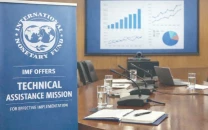Taking sides with technology
People have used technology to address civic, political tribulations. Its, however, easy for technology to be misused

The writer is currently pursuing a Master’s degree in Communication Practice at Columbia University. She tweets @anamk10
In his book, Shirky describes an online service called Ushahidi to provide an example of how people used the internet to collaborate and help one another during a time of political instability. Ushahidi was developed to help citizens keep track of ethnic violence during the December 2007 election period in Kenya. The Kenyan government banned mainstream media outlets from reporting on the violence. Ory Okolloh, a Kenyan political activist, began blogging about the violence. She asked her readers to email or post comments about the hostilities they were witnessing. Ushahidi proved to be a helpful solution that gave people an opportunity to come together and share valuable information with one another. Kenyan NGOs used Ushahidi to locate areas that required humanitarian responses. This example supports the notion that problems, such as a lack of trust in political systems, can sometimes have technological solutions.
Shirky also draws attention to a time in 2008 when South Korean girls used a boy band’s online bulletin board to voice their opposition against the South Korean market allowing US beef imports back into the country. Several sources of beef in the US had been contaminated with mad cow disease. According to Shirky, the site provided these girls with an opportunity to discuss whatever they wanted, including politics. The website gave Korea’s youth a platform to coordinate protests centered on food safety. Former president Lee Myung-Bak eventually negotiated additional restrictions on US beef imports. Online collaboration, hence, gave Korea’s youth a chance to alter a policy it found disagreeable.
Shirky continues his enthusiastic appraisal of technology by explaining that the internet gives people an expansive platform to improve the lives of other individuals. He, however, does not touch on instances where technology has been used as a tool to disrupt people’s lives in the most negative sense. In 2011, it was reported that the annual value of the retail market for surveillance tools increased from nearly zero in 2001 to approximately $5 billion a year. This sudden increase in demand indicates that surveillance practices are on the rise. Unfortunately, these are not solely implemented by legitimate law enforcement. There are, for instance, examples of governments that have utilised technology to monitor and censor their citizens.
According to a 2012 report, dozens of political activists in Bahrain testified that security officers detained and beat them after reading transcripts of their text messages and emails. It was also reported that Muammar Gaddafi’s regime spied on Al Jazeera journalist Khaled Mehiri by monitoring his emails and Facebook messages. Mehiri was eventually interrogated and threatened by the head of Libyan intelligence. It’s not accurate to say that Shirky is entirely incorrect. Yes, people have certainly used technology as a platform to address civic and political tribulations. It is, however, also easy for technology to be misused.
Published in The Express Tribune, May 13th, 2015.
Like Opinion & Editorial on Facebook, follow @ETOpEd on Twitter to receive all updates on all our daily pieces.















COMMENTS
Comments are moderated and generally will be posted if they are on-topic and not abusive.
For more information, please see our Comments FAQ